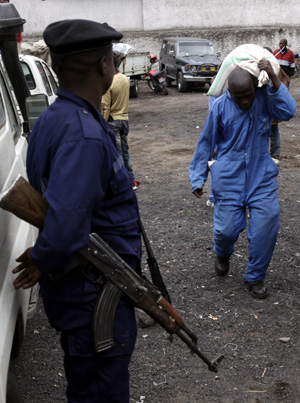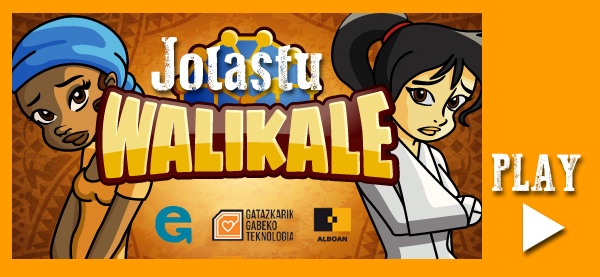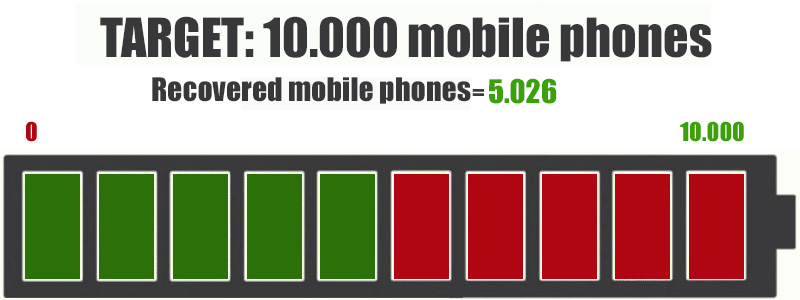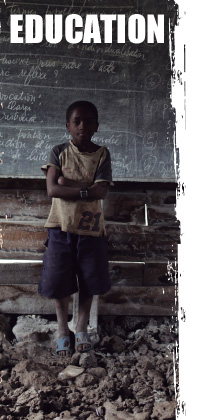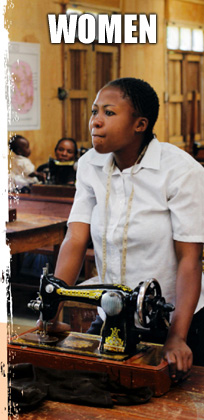- What is the school corner?
- ALBOAN NGO
- Campaign objectives
- Proposed actions
- Causes and consequences of the conflict in Congo
- Materials
- Mobile phone collection
- Projects supported in R.D. Congo
What is “the school corner”?
We want to use this space to channel schools’ participation in the Conflict-Free Technology campaign. To this end, we have created various sections that provide information about the campaign along with educational initiatives and different participation options.
Specifically, this space responds to the agreement between Euskal Herriko Ikastolak and ALBOAN to generate an educational and student mobilisation initiative related to the Conflict-Free Technology campaign. The initiative is included in the social science textbook published by IKASELKAR.
ALBOAN NGO
We are an international cooperation Jesuit NGO in the Basque Country and Navarre. Together with many people excluded by the system in which we live, we work to build a global citizenship that denounces the injustices that cause inequality in the world, building a culture that promotes the common good and transforms the structures that generate poverty at a local and global level.
We have joined forces with a network of people and groups from around the world to achieve our objectives. Our specific contribution to this collective construction of a “culture of life” focuses on the following topics:
- Quality education.
- Sustainable and equitable economic/productivity development.
- Humanitarian action in recurrent crises.
- Democracy in favour of excluded persons.
We incorporate three cross-cutting themes in everything we do:
- Spirituality as a dimension in the future of human development.
- The recognition of inequalities between women and men and a commitment to gender equity.
- Citizen participation for social and political impact.
Please visit our website for more information.
Campaign objectives
MAIN CAMPAIGN OBJECTIVE: Raise awareness about how phones, tablets and computers are linked to the war in eastern Democratic Republic of Congo.
Additional objectives:
- Raise awareness about the humanitarian crisis in eastern Democratic Republic of Congo, providing evidence of the link between the war in this region and mineral ore mining and our tech-thirsty culture.
Mobile phones are a key product that uses an almost countless number of minerals, specifically the four so-called “conflict minerals” that finance armed groups in the region.
Influence European legislation to regulate the import of minerals as a way to ensure that the minerals that enter the European Union do not contribute to financing armed groups.
- Offer mobilisation initiatives that involve citizens:
- Training in the responsible use of technology: for volunteer groups and educational centres.
- Collecting signatures to amend European regulations.
- Economic partnerships with humanitarian projects in the region.
- Mobile phone recycling.
Proposed actions
 Signature collection: ALBOAN has designed a campaign to gather the signatures needed to bring our demands to political representatives. We want a European regulation that prevents international trade in mineral that fuel armed conflict. These signatures will show our representatives that, as citizens, we want our institutions to stop the sale of illegally extracted minerals and the violation of human rights in eastern Congo.
Signature collection: ALBOAN has designed a campaign to gather the signatures needed to bring our demands to political representatives. We want a European regulation that prevents international trade in mineral that fuel armed conflict. These signatures will show our representatives that, as citizens, we want our institutions to stop the sale of illegally extracted minerals and the violation of human rights in eastern Congo.
- You can sign our petition using your e-mail address.
- You can download a PDF of the signature sheet and send them to us by post or scanned in an e-mail.
- You can share the initiative with your contacts and on social media.
 Mobile phone collection: “Mobiles for the Congo” is an initiative with ties to “Conflict-Free Technology”, a campaign that encourages people donate their unused mobile phones for recycling, depositing them in specially designed collection boxes located in different stores and companies. Learn more about the initiative and how you can participate.
Mobile phone collection: “Mobiles for the Congo” is an initiative with ties to “Conflict-Free Technology”, a campaign that encourages people donate their unused mobile phones for recycling, depositing them in specially designed collection boxes located in different stores and companies. Learn more about the initiative and how you can participate.
 Fundraising: Help organise fundraisers and activities to raise proceeds that will go to help people displaced by the conflict in eastern DR Congo. ALBOAN helps support projects that aim to improve education and the situation of women in the region.
Fundraising: Help organise fundraisers and activities to raise proceeds that will go to help people displaced by the conflict in eastern DR Congo. ALBOAN helps support projects that aim to improve education and the situation of women in the region.
Causes and consequences of the conflict in Congo
Causes:The DRC, particularly eastern Congo, is one of the world’s major mining regions. It is home to 80% of the world’s coltan reserves, a vital mineral that makes a vast array of new technologies, particularly mobile phones, possible. The DRC also possesses three other minerals that perform essential functions in mobile phones: gold, tungsten and tin. These minerals, scarce and therefore expensive, are called ‘conflict minerals’ or ‘blood minerals’.
While these ‘blood minerals’ are not the central cause of the conflict, natural resources have largely fuelled the violence. From the colonial power of the late nineteenth century to today’s armed groups and their regional allies who fight for political power, all have valued and used these natural resources as a source to finance and fund the conflict.
Consequences:
- The conflict has claimed the lives of over five million people since 1998.
- A million people were displaced in 2013 alone.
- The systematic violence against women is also alarming. The United Nations estimates that at least 15,000 women are raped every year, a figure that experts say has increased exponentially, to 400,000 victims a year in the conflict’s peak years.
- Farming has been largely abandoned for work in the mines. This has resulted in a major food crisis, characterised by a shortage of local staples like cassava flour.
- It is estimated that 3.5 million school-age children (6 to 11) and roughly 5 million adolescents (12 to 17) do not attend school.
- ‘Blood minerals’ are those that come into our hands hidden in our phones. Without realising it, we are helping to fund the ongoing exploitation of thousands of people who work in the mines and financing armed groups involved in conflicts.
Materials
Fact sheets
There are certain electronic devices that have taken up permanent residence in our pockets and bags, devices that many consider indispensable. We are talking, of course, about mobile phones. But what do we really know about them? What do we know about the impact of their manufacturing and use?
The purpose of the “Conflict-Free Technology” campaign is to raise awareness about the many devices we use in our daily lives and tech-hungry lifestyles without knowing where they come from, where they are manufactured or assembled and under what conditions, or what happens to them at the end of their lifecycle.
The files that we present below also include a brief introduction to some of the core issues linked to the relationship between our lifestyles and certain human rights abuses and violations that affect the people who help produce the devices we enjoy.
How can your mobile change the world?
Download File 00.
Defining CONFLICT MINERALS
Download File 01.
The path minerals take to our pockets and back.
Download File 02.
Online game
Walikale is an online game that helps raise awareness about the use of mobile technology and its relationship to the conflict in DR Congo.
Mobile phone collection
We want to set the record for the number of mobiles collected specifically for Euskal Herriko Ikastolak. Will you help us get to 10,000?
COUNTER OF MOBILE PHONES COLLECTED BY IKASTOLAS AS PART OF THE AGREEMENT BETWEEN EUSKAL HERRIKO IKASTOLAK AND ALBOAN.
In this section you can see how far along we are in reaching our mobile phone collection target, with each block indicating the goal of 1,000 mobiles collected for a total of 10,000 mobiles for the Congo. The blocks will turn green as we get closer to our goal. When all blocks are green we will have collected a total of 10,000 mobile phones.
Projects supported in R.D. Congo
ALBOAN has been working side by side with Congolese organisations and the Jesuit Refugee Service for years, supporting projects that help improve the situation for people in eastern D.R. Congo.
We work specifically in the field of education, striving to improve educational quality and children’s access to it in order to increase their opportunities in life. Moreover, we support organisations dedicated to helping women who are victims of sexual violence. This work is crucial in a country like the Democratic Republic of Congo, which has often been regarded as one of the worst places to live for woman because of the discrimination and violence they face.

